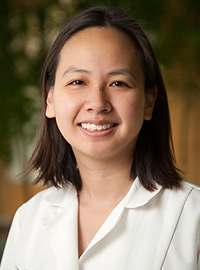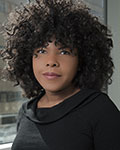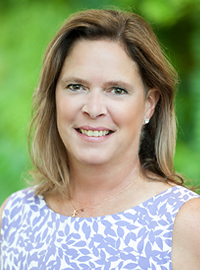

Our mission is to equip the Department of Pathology’s staff and faculty with shared language, practices, tools, and dialogues to diagnose racism at personal, interpersonal, and institutional levels to promote racial equity and social justice. We do this by accomplishing our goals to:
Contact Us
For general information, questions, suggestions for events, etc; please contact us at:
Team.PART@umich.edu
Or team lead Angela Wu:
angelawu@umich.edu
 |
Angela Wu, MD I am passionate about the work we are doing in this task force; one thing that I have learned over the years is that everyone has biases that they need to work through. Despite the depressing divisiveness in our country over the past few years, when I look at younger generations and at the work that this task force is trying to do, I have hope that we can tackle structural racism together. |
|
 |
Marie Brady At my core, I believe that anti-racism is pro-people. We do not live in a zero-sum society, where if one person succeeds someone else must fail; everyone can be successful without depriving others of their own success. In many cases, the arguments of racists are ruses to justify hating others. If no one counters those justifications, those who harbor them will feel free to continue. |
|
 |
Keisha Beck I still believe in the innate goodness of people. We are not born with racism in our hearts, we are taught it, and the only way to combat racism is to live and teach anti-racism. We all have to be made aware of our own biases in order to eliminate them. As we educate and improve ourselves, we are in a better position to be an example to the next generation. |
|
.jpg) |
Eileen McMyler As a project manager, I’m always thinking about how we get from where we are to where we want to be. I’m striving to get to the ‘Growth Zone' depicted in Andrew M. Ibrahim’s, Becoming an Anti-Racist Model. For context, according to Ibram X. Kendi, there is no neutrality in the racism struggle. “One either believes problems are rooted in groups of people, as a racist or locates the roots of problems in power and policies, as an anti-racist.” |
|
 |
Christine Rigney I am passionate about health equity, anti-racism, and sexism. I want to actively be a part of the changes that need to be made. Educating ourselves about bias and racism gives us a way to build a strong foundation and platform to educate and role model for others in the community and at work. As a member of this task force, I am actively becoming part of the solution and not a passive bystander to inequality and racism. |
|
Michigan Medicine Anti-Racism Oversight Committee (AROC)
Michigan Medicine Office of Health Equity and Inclusion: Events
Putting Racism on the Table: Expanding the Table for Racial Equity
United Way 21-day Equity Challenge
21-Day Racial Equity Habit Building Challenge: America & Moore
TIME’S UP Guide to Equity and Inclusion
Asian American Racial Justice Toolkit
A Conversation on Race: The New York Times
Resources for Combating Anti-Native and Indigenous Racism
Books on Latino Life: The New York Times
TED Talks to help you understand racism in America
The Carr Center / A New Awakening: 2nd Annual Young Artist Exhibition
African American Cultural and Historical Museum of Washtenaw County
 ON THE COVER
ON THE COVER
Breast team reviewing a patient's slide. (From left to right) Ghassan Allo, Fellow; Laura Walters, Clinical Lecturer; Celina Kleer, Professor. See Article 2014Department Chair |

newsletter
INSIDE PATHOLOGYAbout Our NewsletterInside Pathology is an newsletter published by the Chairman's Office to bring news and updates from inside the department's research and to become familiar with those leading it. It is our hope that those who read it will enjoy hearing about those new and familiar, and perhaps help in furthering our research. CONTENTS
|
 ON THE COVER
ON THE COVER
Autopsy Technician draws blood while working in the Wayne County morgue. See Article 2016Department Chair |

newsletter
INSIDE PATHOLOGYAbout Our NewsletterInside Pathology is an newsletter published by the Chairman's Office to bring news and updates from inside the department's research and to become familiar with those leading it. It is our hope that those who read it will enjoy hearing about those new and familiar, and perhaps help in furthering our research. CONTENTS
|
 ON THE COVER
ON THE COVER
Dr. Sriram Venneti, MD, PhD and Postdoctoral Fellow, Chan Chung, PhD investigate pediatric brain cancer. See Article 2017Department Chair |

newsletter
INSIDE PATHOLOGYAbout Our NewsletterInside Pathology is an newsletter published by the Chairman's Office to bring news and updates from inside the department's research and to become familiar with those leading it. It is our hope that those who read it will enjoy hearing about those new and familiar, and perhaps help in furthering our research. CONTENTS
|
 ON THE COVER
ON THE COVER
Director of the Neuropathology Fellowship, Dr. Sandra Camelo-Piragua serves on the Patient and Family Advisory Council. 2018Department Chair |

newsletter
INSIDE PATHOLOGYAbout Our NewsletterInside Pathology is an newsletter published by the Chairman's Office to bring news and updates from inside the department's research and to become familiar with those leading it. It is our hope that those who read it will enjoy hearing about those new and familiar, and perhaps help in furthering our research. CONTENTS
|
 ON THE COVER
ON THE COVER
Residents Ashley Bradt (left) and William Perry work at a multi-headed scope in our new facility. 2019Department Chair |

newsletter
INSIDE PATHOLOGYAbout Our NewsletterInside Pathology is an newsletter published by the Chairman's Office to bring news and updates from inside the department's research and to become familiar with those leading it. It is our hope that those who read it will enjoy hearing about those new and familiar, and perhaps help in furthering our research. CONTENTS
|
 ON THE COVER
ON THE COVER
Dr. Kristine Konopka (right) instructing residents while using a multi-headed microscope. 2020Department Chair |

newsletter
INSIDE PATHOLOGYAbout Our NewsletterInside Pathology is an newsletter published by the Chairman's Office to bring news and updates from inside the department's research and to become familiar with those leading it. It is our hope that those who read it will enjoy hearing about those new and familiar, and perhaps help in furthering our research. CONTENTS
|
 ON THE COVER
ON THE COVER
Patient specimens poised for COVID-19 PCR testing. 2021Department Chair |

newsletter
INSIDE PATHOLOGYAbout Our NewsletterInside Pathology is an newsletter published by the Chairman's Office to bring news and updates from inside the department's research and to become familiar with those leading it. It is our hope that those who read it will enjoy hearing about those new and familiar, and perhaps help in furthering our research. CONTENTS
|
 ON THE COVER
ON THE COVER
Dr. Pantanowitz demonstrates using machine learning in analyzing slides. 2022Department Chair |

newsletter
INSIDE PATHOLOGYAbout Our NewsletterInside Pathology is an newsletter published by the Chairman's Office to bring news and updates from inside the department's research and to become familiar with those leading it. It is our hope that those who read it will enjoy hearing about those new and familiar, and perhaps help in furthering our research. CONTENTS
|
 ON THE COVER
ON THE COVER
(Left to Right) Drs. Angela Wu, Laura Lamps, and Maria Westerhoff. 2023Department Chair |

newsletter
INSIDE PATHOLOGYAbout Our NewsletterInside Pathology is an newsletter published by the Chairman's Office to bring news and updates from inside the department's research and to become familiar with those leading it. It is our hope that those who read it will enjoy hearing about those new and familiar, and perhaps help in furthering our research. CONTENTS
|
 ON THE COVER
ON THE COVER
Illustration representing the various machines and processing used within our labs. 2024Department Chair |

newsletter
INSIDE PATHOLOGYAbout Our NewsletterInside Pathology is an newsletter published by the Chairman's Office to bring news and updates from inside the department's research and to become familiar with those leading it. It is our hope that those who read it will enjoy hearing about those new and familiar, and perhaps help in furthering our research. CONTENTS
|

MLabs, established in 1985, functions as a portal to provide pathologists, hospitals. and other reference laboratories access to the faculty, staff and laboratories of the University of Michigan Health System’s Department of Pathology. MLabs is a recognized leader for advanced molecular diagnostic testing, helpful consultants and exceptional customer service.